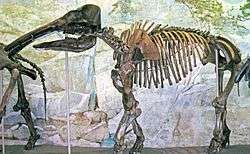Eubelodon
Eubelodon is an extinct genus of gomphothere (a family in the order proboscidea, which also includes modern elephants) which lived in North America during the Miocene Epoch. It contains a single species: Eubelodon morrilli. Like other gomphotheres it had a superficially elephant-like appearance with a trunk and tusks.
| Eubelodon | |
|---|---|
 | |
| Skeleton | |
| Scientific classification | |
| Kingdom: | |
| Phylum: | |
| Class: | |
| Order: | |
| Family: | |
| Genus: | †Eubelodon Barbour, 1914 |
| Species | |
| |
Fossil distribution

Fossils are restricted to what is now the Great Plains of the United States. Remains were found in the Poison Ivy Quarry, Antelope, Brown County, Nebraska, and Tripp County, South Dakota.[1]
Taxonomy
Eubelodon was named by Erwin Hinckly Barbour in 1914. It was synonymized subjectively with Trilophodon by Osborn in 1918 and again by Tobien in 1973 with Gomphotherium.[2]
It was assigned to Gomphotheriidae by Erwin Barbour in 1914. It was then assigned to Rhynchotheriinae by McKenna and Bell in 1997,[3] Carroll in 1988, Shoshani and Tassy in 1996, Lambert and Shoshani in 1998, and Shoshani and Tassy in 2005.
Taxonomic position among trilophodont Gomphotheres:[4]
†Gomphotheriidae (Gomphotheres) |
| ||||||||||||||||||||||||||||||||||||||||||
References
- Paleobiology database, Collections 18147, 18204, 18324.
- H. Tobien. 1973. On the Evolution of Mastodonts (Proboscidea, Mammalia); Part 1, The bunodont trilophodont Groups. Notizblatt des Hessischen Landesamtes fuer Bodenforschung zu Wiesbaden 101:202-276.
- M. C. McKenna and S. K. Bell. 1997. Classification of Mammals Above the Species Level 1-640 (John Alroy and Mark Uhen, George Mason University)
- Mothé, Dimila; Ferretti, Marco P.; Avilla, Leonardo S. (12 January 2016). "The Dance of Tusks: Rediscovery of Lower Incisors in the Pan-American Proboscidean Cuvieronius hyodon Revises Incisor Evolution in Elephantimorpha". PLOS ONE. 11 (1): e0147009. Bibcode:2016PLoSO..1147009M. doi:10.1371/journal.pone.0147009. PMC 4710528. PMID 26756209.